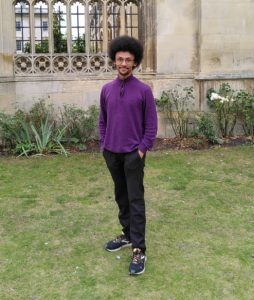
Benjamin Woods is Head of Engineering for 10Be5 Ltd He graduated from the University of Exeter with MPhys Physics in 2015.
What have you been doing since leaving Exeter, and what are you doing now?
After leaving Exeter in July 2015, I started a PhD at the University of York in Plasma Science and Fusion Energy. This involved some theoretical and computational physics, a lot of maths, and some machine learning. I submitted my thesis in August 2019.
Shortly after that, I began a brief postdoctoral position at the University of Leeds, working with machine learning algorithms.
My position ended in February 2020, and shortly after that I began working for The MathWorks as a Technical Writer, writing documentation for Parallel Computing Toolbox. While working at The MathWorks, I consulted for a legaltech startup, 10BE5 Ltd.
I left The MathWorks in 2021 to work full-time for 10BE5 as a Solution Architect, working in a Python / Node.js / React stack to provide tech solutions for law firms and other customers.
“writing code is a much more of a creative process than many people think – for me, the creative part is as much of a draw as the technical side”
Why did you choose this career? And what do you enjoy most about your work?
My career path lead me towards machine learning and computer science in the end. I feel that I always had a passion for computer science and data, and so this felt like a natural progression after my PhD. Although I am very much a physicist at heart, I love the design and thought processes that go into making code. From what I can tell, writing code is a much more of a creative process than many people think – for me, the creative part is as much of a draw as the technical side.
“my year bonded together very well and looked out for each other… if anyone was struggling with lecture content, or finding it tough to revise, most people were happy to chip in and have a chat.”
What did you enjoy most about your programme and what was the biggest highlight?
Course wise, I loved the modules that were leaning more toward maths or theoretical physics. I was very much a fan of Analytical and Chaotic Dynamics (PHY2032), and Quantum Many Body Theory (PHYM013). Outside of the course content, for me the community was the best thing – I felt that my year bonded together very well and looked out for each other. For me at least, it seemed like if anyone was struggling with lecture content, or finding it tough to revise, most people were happy to chip in and have a chat. Being able to openly discuss tough parts of the course with other students in the year was an invaluable thing. (And to be honest, it’s quite a rare thing to find that level of support amongst peers in the outside world!)
What skills and experiences have been most useful for your career?
For me, the course itself really set me up well for my time in academia – even though I didn’t do any plasma physics in my course, I felt like I had a strong enough physics background to apply for a PhD outside of the area I specialized in for my Masters project (which was a bit of a gamble!)
“Although it’s easy to get frustrated with your critics, don’t hate them. They’re very important. Your research grows stronger and more important with every critic to defeat. However, if you can’t justify the value of your research, you have to accept that they might be right.”
What advice would you give to a current student who wishes to pursue your career?
Coding: write plenty of code, read plenty of code, and talk with coders. Learning programming languages is like a real language – immersion is the fastest way to fluency. Academia: to succeed, you have to both do good research and sell that research. Although it’s easy to get frustrated with your critics, don’t hate them. They’re very important. Your research grows stronger and more important with every critic to defeat. However, if you can’t justify the value of your research, you have to accept that they might be right. Being stubborn will only get you so far. Many times, researchers have “settled” for simpler problems, and made entire careers out of what they initially thought was a fairly trivial problem…
“…write plenty of code, read plenty of code, and talk with coders”
What are your plans for the future?
I’d like to work on some more open source projects. I’d also like to get my 5k time a bit better…
